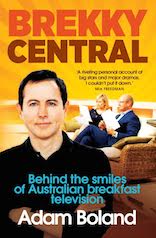Adam Boland: ‘My new book is my report card’
Former Sunrise executive producer Adam Boland spoke to Miranda Ward about how his new memoir Brekky Central is mostly about his own failings, and why he can never return to commercial TV.
Adam Boland admitted he was caught “on the hop” when his memoir, which details both his time at Seven and Ten, was rushed into bookstores today following court action from Seven, but claimed “if anyone gets heavily criticised in the book, it’s me”.
Last Friday Network Seven started court action to get hold of the book prior to publication, with a view to an injunction if the former TV exec credited with turning around Sunrise had broken his confidentiality agreement with them.



“beauty’s”?
Still using google plus Adam?
Good God, when will his droning on ever end. The book has little to offer as far as revelations go: Grant Denyer is short, David Leckie says F*ck… a lot, Some people don’t like Mel/Kochie/Whoever. It is a yawn fest for anyone other than his ‘poor adam’ twitter fans, friends, relatives and assorted exes. By all means buy it or alternatively go and have a few drinks instead, or give the 34 bucks to a homeless person who will actuallybe grateful and needs the cash.
Mr Boland get off the stage, you built for yourself and kindly bugger off.
I won’t part with $34 I will wait until someone else buys and borrow. Given Sunrise’s association with Youth of the Streets and Father Chris via David Koch,maybe Adam should consider a % of sales going to those young people all 50,000 of them Father has assisted since 1991. I was at the network at the time and spent just about every morning at 6am in the control room or on the studio floor when the show was nothing but a slaughter by Today, I know the people who made the show it now is,not solo Boland so be interesting if those hard working people who copped plenty of shit get a pat on the back.